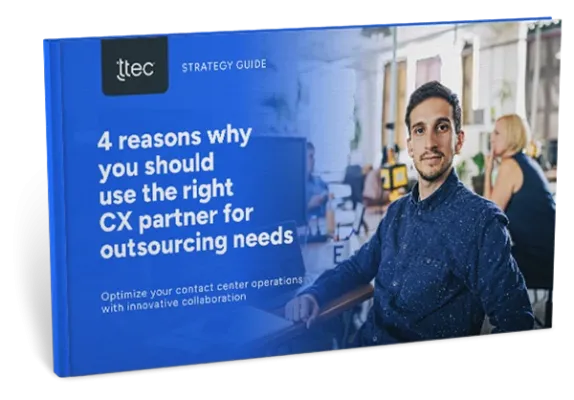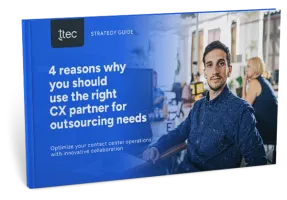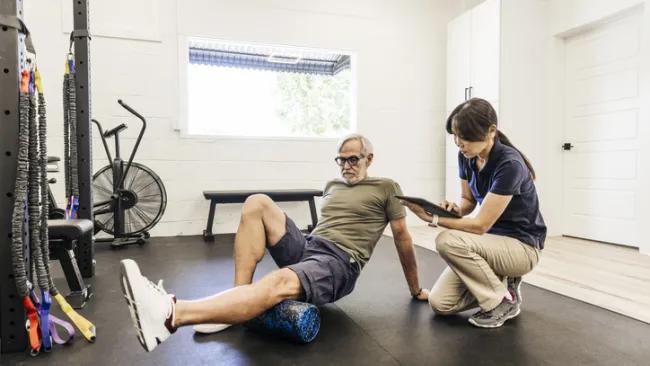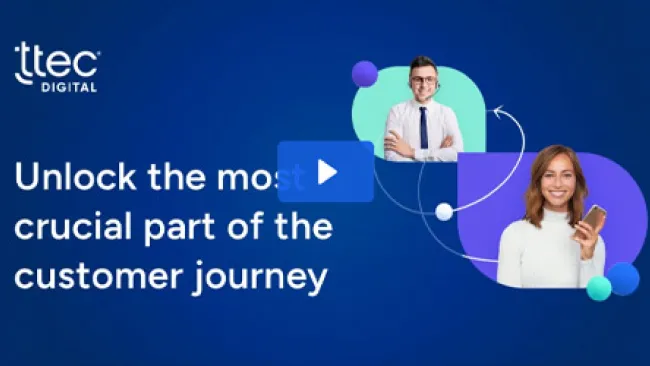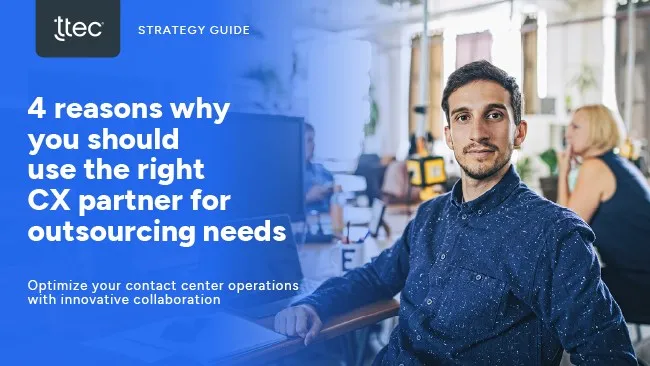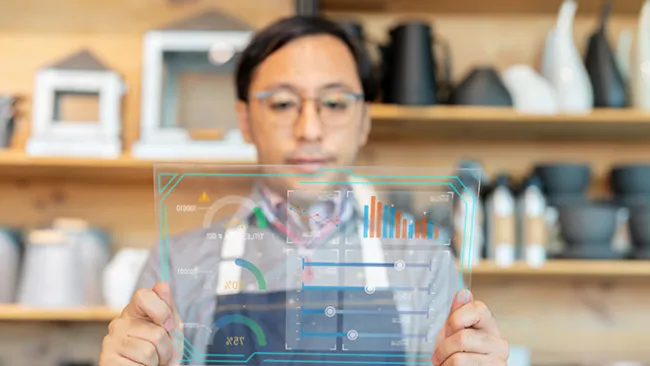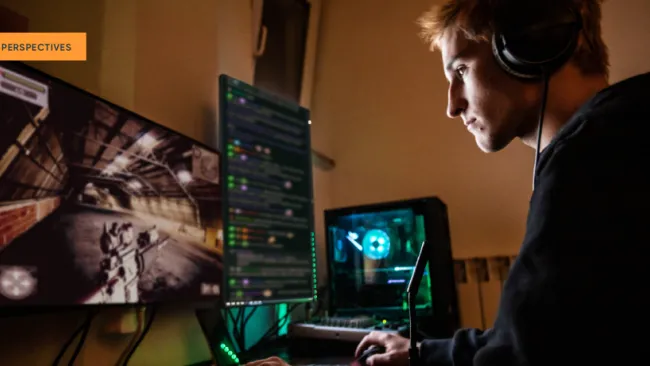Clear the way for the newest series on the block, CX BanterCast! TTEC’s own Tim Keefe and Andreas Wieman are partnering up to deliver their takes on what’s paving the way for amazing leadership, innovations, and technologies all in the CX world. In their pilot episode we’ll explore how customer and employee experience is evolving in a post-pandemic world.
Key takeaways:
- Employees are embracing the flexibility of remote work. And they’re not going to give it up.
- Companies who embrace authentic, consistent, communication will stand out. Be adaptive.
- You can either be the one who disrupts your industry or you can be disrupted. Your choice.
Transcript:
Liz Glagowski: You're listening to the CX Pod from TTEC and the Customer Strategist Journal.
Tim Keefe: Hi, this is Tim Keefe, and welcome to TTEC’s CX BanterCast. And we're here to talk about customer experience as it's evolving in a post pandemic world. With that, I'd like to introduce my friend Andreas and why it matters that his opinion even is worthwhile listening to.
Andreas Wieman: Yeah, well, that's up for debate. Andreas Wieman here. VP of value engineering for TTEC. And what Tim and I do and our group does is we look at traditional staffing models in the world of CX and introduce the new and emerging technologies and solutions and services, and how we actually tactically implement and operationalize those and tie them into the larger strategy. It's definitely not as cool as I just described it, but it is a lot of fun and you get to work with a lot of great people, Tim aside.
TK: Hi, everybody. It's Tim Keefe. I also work in a value engineering group and every time I do one of these podcasts with Andreas, I find out that we do something different. But again, one of the things that we're here to talk about is really customer experience as we see it in a post pandemic world. And this will be a series of podcasts on deep dives around a series of topics that we want to talk about. But as an introduction, we really want to get into what's happened over the last 18 months and how does that influence what we should be doing going forward?
One of the things that was very clear is that this whole concept of work-at-home went from being an interesting study by a lot of companies. As we've seen, there were companies that I've been working with that have spent as long as a decade debating, planning, negotiating how they could possibly do work-at-home and then resulting in small pilot groups, employees working at home with mixed results.
And then in March and April of 2020, guess what? Everybody, without fail, had to figure it out. Some companies actually had pretty good background on it, had been dominantly virtual. The company we work for, a significant portion of our employee base were already work-at-home. So we had the advantage of having processes, technology, operations, remote VPN capabilities in place to support us.
But many of our clients, on the other hand, needed our help to get there. And it was very exciting. Again, 72 hours in some cases, a couple of weeks in others, but we all went to work-at-home. That's not going away. Employees are now used to it. People have relocated. A lot of debate around geolocation based salaries and all the rest of that stuff. I think that there's going to be a lot of evolution in this in the next couple of years. But the reality is, I don't think it's going away.
AW: Yeah. No, I agree. I don't think it's going anywhere. Pop up any news article right now and the great debate is around bringing people back into the office and I think-
TK: Yeah, but don't forget, the great debate leads to the great resignation.
AW: Yeah. Well, I mean, we're there. We're there. I mean, the talent circumference is non-existent nowadays. And any survey that you go out there and look at, one of the things at the top, if not be top component, of employees is being able to have the flexibility to be virtual. Maybe go into the office one or two days a week, but have that flexibility. And so I think it was interesting when you were saying everybody pivoted really quickly and it was eye opening. A lot of clients that we talked to had always kind of teetered on whether they want it to work at home or not, but they just, kind of honestly, it's the way it was always done. And when they had to make that snap decision, the companies that didn't have the experience and background or tools or expertise, they stood up a VPN and then just threw the people at home and allowed them to remote in.
It's not that easy. I mean, there's a reason why Zoom excelled and the collaborative tools that it introduced even more recently, the Five9 acquisition, they're making a concerted bet that this is going to be ongoing. And I think you're seeing a lot of companies who now have already made the call they're going to stay virtual. So there's going to be a lot of interesting developments and software and ideas that are going to come out over the next year or two, I think, on virtualization improvements, augmented reality and engagement, all kinds of really cool things that I'm looking forward to seeing and being a part of.
LG: We'll be right back.
Ad: Looking to create an exceptional customer experience? Check out TTEC.com/happycustomers. There you'll find great tips, strategies and tools to make every customer interaction shine. Now, back to the interview.
TK: Take the fact that companies now internally have had to make a dramatic evolution in the way they operate and the work-at-home and virtualization. But now think about the ongoing, and this was even before the pandemic, evolution in the way that our customers want to engage with their various vendors. And when I say customers, it's not to limit that conversation to consumers, because that's often what people think about, but it's all the other categories of personas in the world that are interacting with the vendor. And that's members, businesses, technicians, and even constituents in the public sector that are looking for more effective 24 by seven ways to engage with their vendors. So this is the kind of stuff that I think is going to be disruptive opportunities for companies that want to be in there first. I love it. Or I shouldn't say I love it. But as a consultant and as a company that helps companies evolve, one of the things that I love hearing in a meeting is "Well, we've always done it that way." That is a ding, ding, ding, ding. That's the opportunity. And you have two choices. You can either be the one who disrupts your industry or you can be disrupted. Your choice.
AW: Yeah. Well, I mean, think about it like this. The resiliency you seen from the adaptiveness of, I think, just the demographic mix of the old way of doing things, like you just said, or the way that it's always been done, and the new kind of generation that's coming up who had to evolve and adapt really quickly in the new business world, the meshing of those two ideas. I don't think the pendulum is swinging anyone which way. We can't go completely virtual. We're not ready for that. But obviously we've got to adapt and can't do it the way that things have been. I think you're going to see a unique circumstance with the meeting of those minds and the collaboration of those minds. It's going to be in necessity to figure this out in the interim and in the longer term. So again, it's something I'm looking forward to, just as an observer, seeing how that works out, and then a participant obviously with TTEC and the clients that we work with.
TK: No. It's going to be fun. And maybe fun is not the right word. But as the ancient Chinese curse is, “may you live an interesting life.” So we're definitely living an interesting life. So just as an introductory, and that was our intent today to kind of introduce you to us, introduce you to what we're interested in. We'd love to hear more from you. We've got a series of other topics that we're going to do deep dives on. Some of them are going to be what to measure in a new world of customer experience, evolution of technology and what I call presentation layer technology. How do we engage with people and how do they learn? How do they get information, et cetera. There's even probably an interesting conversation about the economics of the evolution. I mean, I'm sure there were a lot of CFOs that were looking around during the pandemic with empty buildings going, "Hmm. Let me see. I don't have anybody in the office. Work is getting done. We had some of the best quarters that some of these companies have ever seen financially. Hmm. Maybe I'm not such a big rush to get back to the way things were before."
So with that, I want to say thank you for your time, Mr. Andreas.
AW: Yeah. Thanks. We appreciate it. And drop comments in on any specific topic that you'd like to hear us. Again, CX BanterCast here. Here, two guys banter back and forth and hopefully you take away some good stuff. We'll bring some good content, some case studies, surveys, anything that we think is relevant and can help. I mean, the purpose of this is ultimately to bring insight and good conversation. Well, conversation. I can't qualify the good statement there. And then we'll have special guests. We got a special guest here that wants to introduce himself real quick.
Arnold Schwarzenegger: Hello, everybody. This is Arnold Schwarzenegger.
AW: Yep. All right, Arnie. Calm down there, guy. We'll get you the next week. So thanks a lot and hope you guys stay happy and healthy.
TK: And by the way, if you have any suggestions on better hosts, let us know.
AW: Yeah. And if you want to fire Tim, there's a vote button.
LG: Thanks for listening. Look for more CX insights by subscribing to The CX Pod where you get your podcasts or visit us at TheCXPod.com or TTEC.com. Thanks. See you next time.

